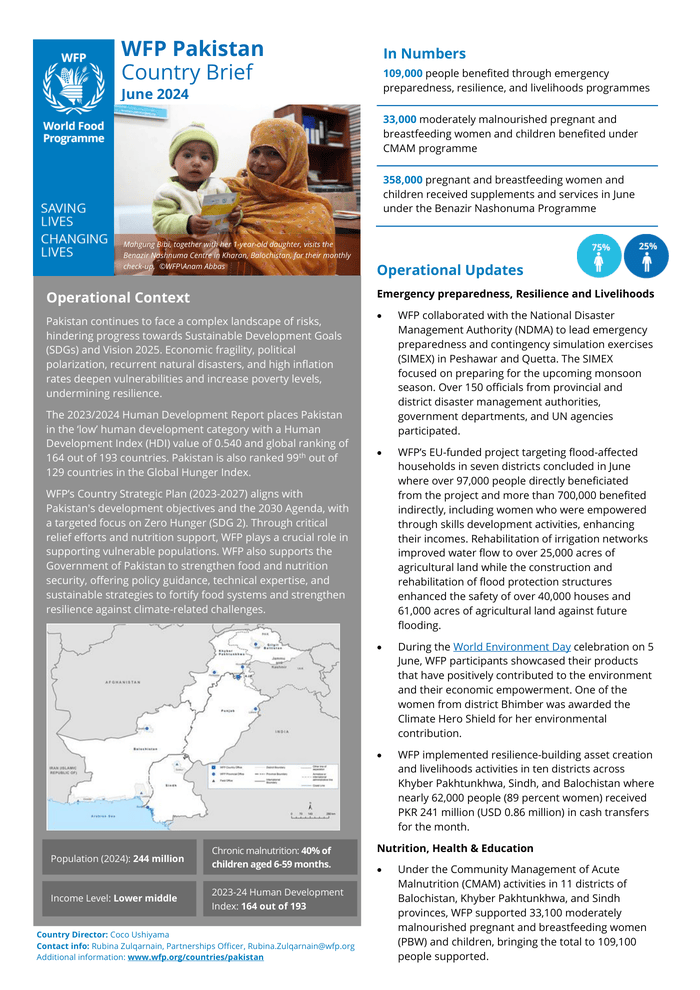By the numbers
109,000 people benefited through emergency preparedness, resilience and livelihood programs
The CMAM programme has benefited 33,000 moderately malnourished pregnant and lactating women and children.
In June, 358,000 pregnant and lactating women and children received nutritional supplements and services under the Benazir Nasional program.
Operational Updates
Emergency Preparedness, Resilience and Livelihoods
- WFP, in collaboration with the National Disaster Management Authority (NDMA), led the Emergency Preparedness and Contingency Simulation Exercise (SIMEX) in Peshawar and Quetta, which focused on preparedness for the upcoming monsoon season and was attended by over 150 officials from provincial and district disaster management authorities, government departments and UN agencies.
- A WFP EU-funded project targeting flood-affected households in seven districts concluded in June, directly benefiting more than 97,000 people and indirectly benefiting more than 700,000 people, including women who have been empowered and increased their incomes through skills development activities. Rehabilitated irrigation networks have improved water flow to more than 25,000 acres of farmland, and the construction and rehabilitation of flood protection structures have made more than 40,000 homes and 61,000 acres of farmland safe from future floods.
- During World Environment Day celebrations on 5 June, WFP participants displayed products that have a positive impact on the environment and economic independence. One woman from Bhimber district was awarded a Climate Hero Shield in recognition of her contribution to the environment.
- WFP implemented resilience-building asset generation and livelihood activities in 10 districts of Khyber Pakhtunkhwa, Sindh and Balochistan, reaching approximately 62,000 people, 89 percent of whom were women, with cash assistance of PKR 241 million (US$ 860,000) for one month.
Nutrition, Health and Education
- As part of its Community Management of Acute Malnutrition (CMAM) activities in 11 districts of Balochistan, Khyber Pakhtunkhwa and Sindh, WFP reached 33,100 moderately malnourished pregnant and lactating women (PBW) and children, bringing the total number of people reached to 109,100.
- WFP partnered with the Government of Pakistan to implement the Benazir Nashonuma Programme (BNP) through 552 outreach centres in 157 districts across the country. To date, a total of 2.2 million PBWs and children have been enrolled in the programme, which covers the first 1,000 days of life. In June, WFP provided 30.1 million packets of special nutritional food and health and nutrition awareness activities to 344,000 PBWs and children aged 6-23 months.
- The BNP programme also enrolled 14,400 malnourished PBW and children, and 5,800 adolescent girls in the programme for treatment of moderate acute malnutrition in June.
- Data collection for the seventh program monitoring round of the BNP program is nearly complete, with a sample of over 2,000 PBWs or children interviewed. Analysis and reporting will be conducted in July.
- WFP continues to provide technical assistance on school feeding across Pakistan. WFP and the Gilgit-Baltistan provincial government have completed a survey in the region to assess possible ways to expand school feeding.
- The school feeding pilot project in Quetta district of Balochistan continues, with WFP completing a district-wide school assessment through targeted surveys. The pilot is due to begin in August.
Food Systems
- WFP has launched an extensive value chain assessment of fortified wheat flour from farm to chakki. The assessment aims to identify key areas where WFP can strengthen the capacity of supply chain and logistics services to smallholder farmers and chakkis. The inception report has been completed and data collection began on 20 June in four districts of Sindh.
Emergency response
- The Pakistan Meteorological Department (PMD) and NDMA have forecast normal to above-normal monsoon rains across Pakistan from July to September 2024. In response, WFP has developed a flood contingency plan to support the Government’s response.
- In addition, WFP and the Pakistan Red Crescent have finalized pilot activities to target preventive actions in vulnerable communities along the Kabul River in Nowshera and Charsadda districts, in case the flood risk in the Kabul River exceeds 150,000m3sec.

